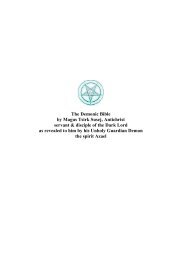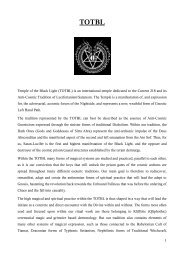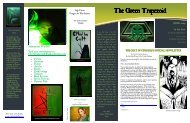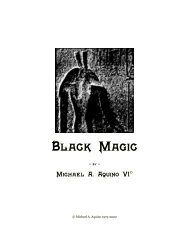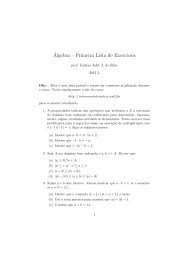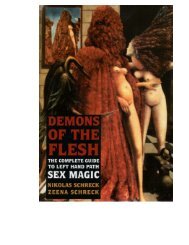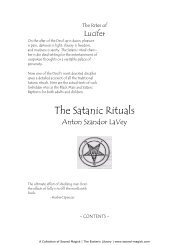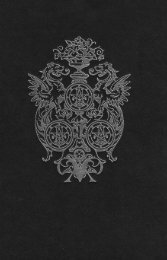Satanism Today - An Encyclopedia of Religion, Folklore and Popular ...
Satanism Today - An Encyclopedia of Religion, Folklore and Popular ...
Satanism Today - An Encyclopedia of Religion, Folklore and Popular ...
Create successful ePaper yourself
Turn your PDF publications into a flip-book with our unique Google optimized e-Paper software.
248 Shakespeare<br />
Thus it is possible for both righteous <strong>and</strong><br />
sinners to change direction. If they do, their<br />
former righteousness or sinfulness ceases to<br />
count. God is regarded as the supreme judge who,<br />
on the day <strong>of</strong> the Last Judgment, rewards <strong>and</strong><br />
punishes mortals on the basis <strong>of</strong> where they end<br />
up. Shakespeare presents this vision in Hamlet’s<br />
hesitation to kill his father’s murderer while the<br />
latter is praying.<br />
There is no doubt that Shakespeare agreed<br />
with the images <strong>of</strong>fered by the creed <strong>of</strong> his own<br />
Protestant Church <strong>of</strong> Engl<strong>and</strong>, which taught that<br />
after death would come an intermediate state to be<br />
followed by the judgment <strong>of</strong> God. On this day,<br />
those who have sinned would have to make an<br />
open confession in front <strong>of</strong> God, trusting to divine<br />
mercy for the saving <strong>of</strong> their souls from hell.<br />
Again, such vision is shown in Hamlet, when<br />
Claudius prays to God to forgive his having<br />
murdered his brother, even though he is<br />
convinced that no pardon can be received while he<br />
is still attached to the fruits <strong>of</strong> his sin.<br />
Shakespeare believed in the temporal nature <strong>of</strong><br />
the body <strong>and</strong> in the immortality <strong>of</strong> the soul, as<br />
numerous passages in his work show, such as in<br />
Romeo <strong>and</strong> Juliet <strong>and</strong> in The Merchant <strong>of</strong> Venice,<br />
even though his characters <strong>of</strong>ten seem to be<br />
desperately attached to life on earth instead <strong>of</strong><br />
concentrating on their spiritual destiny. According<br />
to Shakespeare, after death human lives will be<br />
perpetually remembered by God <strong>and</strong> immortality<br />
is achieved by influencing the lives <strong>of</strong> others who<br />
come after. He conceives <strong>of</strong> heaven as an abode <strong>of</strong><br />
bliss for the souls <strong>of</strong> the righteous, situated<br />
geographically above the clouds, <strong>and</strong> hell as the<br />
place where the damned are eternally imprisoned<br />
<strong>and</strong> tormented by fire. There are few references to<br />
purgatory in Shakespeare’s works because <strong>of</strong> his<br />
antipapal convictions. Shakespeare seems to adopt<br />
an uncritical attitude toward religious supernaturalism,<br />
although he may simply be drawing<br />
elements from folklore <strong>and</strong> popular superstition to<br />
add to the power <strong>of</strong> his drama.<br />
One <strong>of</strong> the forms <strong>of</strong> the supernatural adopted<br />
by Shakespeare is ghostly apparitions, <strong>and</strong> the<br />
frequency with which he introduces them into<br />
his works testifies to the widespread belief in<br />
their reality at his time. They were seen by the<br />
common person as departed spirits who<br />
returned to Earth for some special reason, such<br />
as revenge <strong>and</strong> warning, while the literate<br />
regarded ghosts as devils <strong>of</strong> the underworld in<br />
visible form.<br />
Shakespeare’s ghosts can be actually present<br />
<strong>and</strong> apparent to several people at the same time,<br />
like the ghost in Hamlet, or can be the product <strong>of</strong><br />
the mind <strong>of</strong> the person who sees it, like the ghost<br />
<strong>of</strong> Banquo in Macbeth <strong>and</strong> Caesar’s ghost in Julius<br />
Caesar. Also, they can appear in dreams, such as<br />
the apparitions to Richard III before the battle <strong>of</strong><br />
Bosworth <strong>and</strong> to Posthumus in Cymbeline.<br />
Shakespeare deals with the supernatural in at least<br />
half <strong>of</strong> his plays, but his deepest attitudes toward<br />
this subject at different points in his career are<br />
revealed in four dramas: A Midsummer Night’s<br />
Dream, Hamlet, Macbeth, <strong>and</strong> The Tempest.<br />
In Hamlet, which contains much information<br />
about popular superstition on the subject <strong>of</strong><br />
ghosts, Shakespeare introduces his terrifying<br />
spectre in a cold, dark, silent night, <strong>and</strong> explains<br />
his presence as dictated by a solemn purpose,<br />
which is revenge. In A Midsummer Night’s Dream<br />
the form <strong>of</strong> the supernatural employed is fairies,<br />
who are little, joyous people meddling in human<br />
affairs with no malice. Although they are immortal,<br />
they participate in mortal pleasures, such as<br />
eating, drinking <strong>and</strong> enjoying music <strong>and</strong> dancing.<br />
Macbeth represents the darkest <strong>and</strong> most<br />
pessimistic phase <strong>of</strong> Shakespeare’s life, when he<br />
seems to believe that human beings are<br />
surrounded by terrible influences <strong>and</strong> temptations.<br />
The Weird Sisters are witches who accomplish<br />
their purpose in the ruin <strong>of</strong> a noble character,<br />
<strong>and</strong> possess most <strong>of</strong> the powers credited to the<br />
popular witch, such as assuming a variety <strong>of</strong><br />
shapes. With The Tempest Shakespeare returns to<br />
the freedom <strong>and</strong> happiness <strong>of</strong> his youthful fairy<br />
fantasy, <strong>and</strong> reaches the conclusion that man need<br />
not fear the supernatural.<br />
For Further Reading:<br />
Cumberl<strong>and</strong>, Clark. Shakespeare <strong>and</strong> the<br />
Supernatural. New York: Haskell House<br />
Publishers, 1931.<br />
Hick, John. Death <strong>and</strong> Eternal Life. London: Collins,<br />
1976.<br />
Morris, Harry. Last Things in Shakespeare.<br />
Tallahassee: Florida State University Press, 1985.




